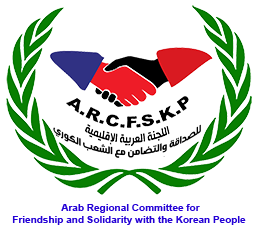The historical struggle of the DPRK and Korean socialism by confronting the West’s propaganda project
International Forum in Support of the Just Struggle of the Korean People for Safeguarding of Sovereignty and Peace
Presented by Booker Ngesa Omole, General Secretary of the Kenyan Chapter of the African Committee for Friendship and Solidarity with the Korean People and National Vice Chairperson of the Central Organizing Committee of the Communist Party of Kenya
The Korean War (1950-1953) marked a significant and tragic chapter in the history of the Korean Peninsula, one that continues to resonate through the present-day geopolitical landscape. The narrative surrounding this conflict has been largely dominated by false Western narratives, often painting the Democratic People’s Republic of Korea (DPRK) in a negative light while overlooking the historical and ongoing provocations by the United States and its allies. This paper aims to articulate the historical facts regarding the DPRK and the Korean socialist project by countering mainstream Western propaganda and highlighting the anti-imperialist struggles of the heroic people of the DPRK
Historical Context and US Provocations
The Korean War was instigated by the United States and its ROK ally through a series of calculated provocations and strategic planning. Following World War II, the United States occupied ROK under the pretext of disarming Japanese forces, but its true objective was to establish ROK as a military foothold for its geopolitical ambitions in Northeast Asia. The US dissolved local people’s committees that had organically formed in Korea, imposed military rule, and established a puppet government under Syngman Rhee, ensuring ROK’s alignment with US objectives
US policymakers viewed Korea as a crucial battleground in the fight against communism, as evidenced by documents like NSC-68, which outlined strategies for global dominance. These strategies included extensive military preparations and conscription laws to bolster US and ROK’s forces. By early 1950, military preparations were reportedly complete, with US and ROK forces ready for offensive operations. The ROK military, with US backing, launched attacks on the DPRK positions, prompting a retaliatory response. This sequence of provocations and the subsequent US-led intervention were framed as responses to aggression of the DPRK, but they were part of a premeditated plan to assert US dominance in the region
The Division of Korea and the Struggle for Sovereignty
The division of Korea at the 38th parallel was an artificial construct imposed by external powers, particularly the United States. The Korean people have a long history of resisting imperialism and colonialism. The dissolution of people’s committees by US forces in ROK were part of a broader effort to suppress genuine democratic and socialist movements
The US viewed Korea as a crucial frontline in its global strategy to contain communism. NSC-68 and other strategic documents highlight the premeditated nature of US actions in the region, focusing on military build- up and readiness for conflict. Evidence suggests that the US and its ROK puppet government engaged in provocations to create a pretext for war. The rapid deployment of US and allied forces following the outbreak of hostilities indicates a high level of preparedness and strategic planning. The Korean War should be seen as part of the broader struggle against imperialism. The DPRK’s resistance to US aggression was in line with the aspirations of many Koreans for independence and social justice
The Ongoing US Disruption of Peace Efforts
The Korean Peninsula remains one of the most militarized and tension-filled regions in the world, with the United States playing a significant role in shaping the dynamics of conflict and peace initiatives. The US is a chief disruptor of peace. The division of Korea at the 38th parallel was a direct result of geopolitical manoeuvring by the United States at the end of World War II
US policies, especially during the administration of George W. Bush, which labeled the DPRK as part of the “Axis of Evil,” have exacerbated tensions and undermined diplomatic efforts. The US has imposed extensive economic sanctions on the DPRK, not to curb its nuclear program but to achieve regime change and install a US puppet. These sanctions have hurt economy of the DPRK. Sanctions are not just tools of coercion but a declaration of war
Multiple instances where peace initiatives were disrupted by US actions highlight this point
The US regularly conducts joint military exercises with ROK, which are rehearsals for the invasion of the DPRK. These exercises increase tensions and provoke natural defensive responses from the DPRK
The Path to Peace: Defeating US Imperialism
Achieving lasting peace on the Korean Peninsula requires the defeat of US imperialism. The total withdrawal of US troops would significantly reduce tensions. Easing economic sanctions could open the door for more constructive engagement with the DPRK, encouraging economic development
The DPRK nuclear program should be viewed as a deterrence; without it, the US would have bombed Pyongyang to pre-history. Establishing diplomatic relations between the US and the DPRK could help to reduce hostilities and build a foundation for lasting peace. Diplomatic engagement and mutual recognition would be important steps towards a comprehensive peace settlement
The US has played a complex and often contentious role on the Korean Peninsula, acting solely as a disruptor. Achieving lasting peace on the Korean Peninsula requires a re-evaluation of US policies, a move towards reducing militarization and economic coercion in favor of diplomatic and cooperative approaches. The heroic struggle of the DPRK and the Korean socialist project stand as testaments to the enduring spirit of resistance against imperialism and the aspiration for sovereignty and peace. It is imperative that the international community recognizes and supports these efforts in the pursuit of a just and lasting peace on the Korean Peninsula
The DPRK remains resilient, steadfastly advancing towards inevitable victory. Communism is an inevitable reality to which all human beings must adjust
Long Live the DPRK
Long Live DPRK-Africa Friendship
Long Live Communism


